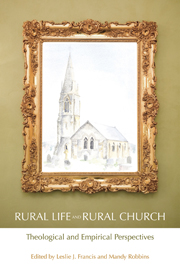Book contents
- Frontmatter
- Contents
- Preface
- Foreword by The Bishop of Shrewsbury, The Rt Revd Mark Rylands
- 1 Introduction: shaping rural theology
- PART 1 PERSPECTIVES FROM THE BIBLE
- PART 2 PERSPECTIVES FROM ORDINARY THEOLOGY
- PART 3 THEOLOGICAL AND SOCIOLOGICAL PERSPECTIVES
- 8 Encountering New Age spirituality: opportunities and challenges for the rural church
- 9 God in creation: a reflection on Jürgen Moltmann's theology
- 10 Belonging to rural church and society: theological and sociological perspectives
- PART 4 HISTORICAL PERSPECTIVES
- PART 5 LISTENING TO VISITORS
- PART 6 LISTENING TO THE COMMUNITY
- PART 7 LISTENING TO CHURCHGOERS
- PART 8 LISTENING TO CHURCH LEADERS
- PART 9 SATISFACTION AND STRESS IN MINISTRY
- Contributors
- Sources
- Subject Index
- Name Index
8 - Encountering New Age spirituality: opportunities and challenges for the rural church
from PART 3 - THEOLOGICAL AND SOCIOLOGICAL PERSPECTIVES
- Frontmatter
- Contents
- Preface
- Foreword by The Bishop of Shrewsbury, The Rt Revd Mark Rylands
- 1 Introduction: shaping rural theology
- PART 1 PERSPECTIVES FROM THE BIBLE
- PART 2 PERSPECTIVES FROM ORDINARY THEOLOGY
- PART 3 THEOLOGICAL AND SOCIOLOGICAL PERSPECTIVES
- 8 Encountering New Age spirituality: opportunities and challenges for the rural church
- 9 God in creation: a reflection on Jürgen Moltmann's theology
- 10 Belonging to rural church and society: theological and sociological perspectives
- PART 4 HISTORICAL PERSPECTIVES
- PART 5 LISTENING TO VISITORS
- PART 6 LISTENING TO THE COMMUNITY
- PART 7 LISTENING TO CHURCHGOERS
- PART 8 LISTENING TO CHURCH LEADERS
- PART 9 SATISFACTION AND STRESS IN MINISTRY
- Contributors
- Sources
- Subject Index
- Name Index
Summary
Abstract – This article reviews the rise of New Age spirituality, locating its origins in widespread disillusionment with the western cultural paradigm and difficulties faced by the Church in offering relevant answers to new questions. At the same time, it argues that the Church has resources, particularly in its rural manifestations, that can begin to address the concerns of today's spiritual searchers.
Introduction
Whenever the expression ‘New Age’ is used in a rural community, it often conjures up images of scruffy dropouts travelling around the countryside in beaten-up buses, camping on other people's land, and playing havoc with local economies. Though that phenomenon is there, describing such people as ‘New Age travellers’ can create the impression that ‘New Age’ concerns only a minority fringe element within society. The reality is, however, quite different, and exponents of mainstream ‘New Age’ spirituality are to be found in all walks of life. Moreover, they are actually raising some fundamental questions about the future of western civilization which, through the impact of globalization, might also be about the future of the world.
Origins
Before turning to the ‘New Age’ proper, it is important to note that it is not the same thing as those organizations that are referred to as ‘New Religious Movements’, or more popularly ‘cults’ (Barker, 1989; Saliba, 1995; Arweck, 2002). Whereas a New Religious Movement (NR M) is typically a highly structured organization, with clear boundaries and definitions of membership, the ‘New Age’ is a much more diffuse category demonstrating a high degree of ambivalence and with no clear boundaries and certainly no concept of membership.
- Type
- Chapter
- Information
- Rural Life and Rural ChurchTheological and Empirical Perspectives, pp. 82 - 93Publisher: Acumen PublishingPrint publication year: 2012

